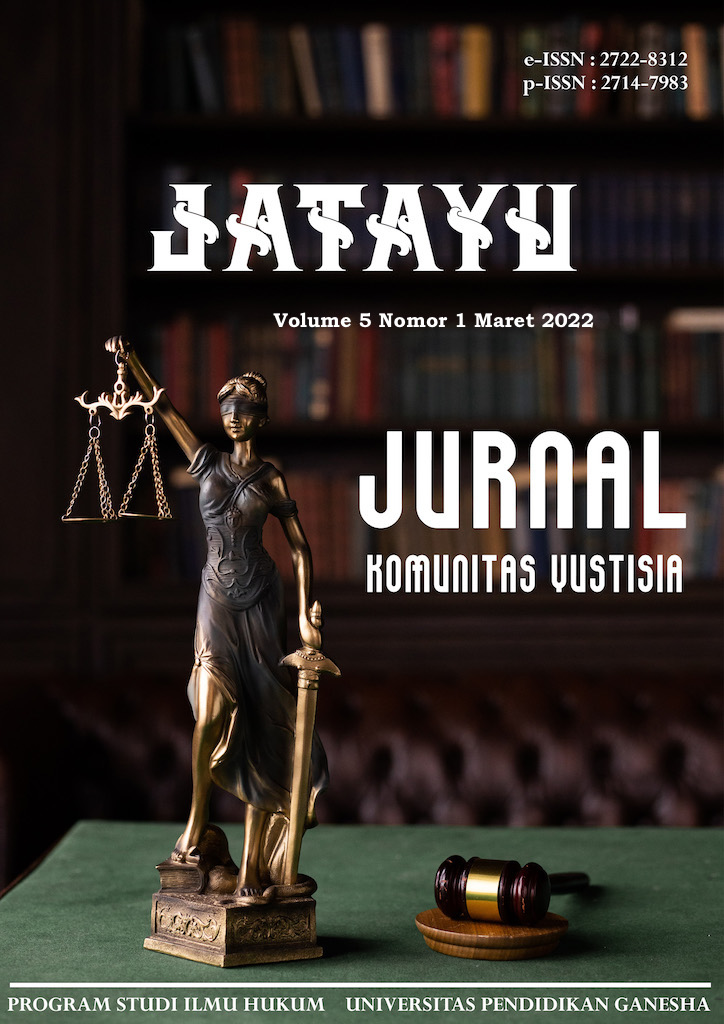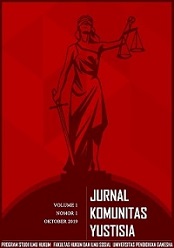PERAN PEMERINTAH DALAM PENCEGAHAN SAMPAH PLASTIK (STUDI KASUS DINAS LINGKUNGAN HIDUP KABUPATEN GUNUNGKIDUL)
DOI:
https://doi.org/10.23887/jatayu.v5i3.52077Keywords:
Pengelolaan Sampah,Sampah Plastik,Dinas Lingkungan Hidup, Kabupaten GunungkidulAbstract
Artikel ini mengkaji peran pemerintah dalam hal ini Dinas Lingkungan Hidup Kabupaten Gunungkidul dalam menangani pengelolaan sampah plastik di wilayah pesisir pantai Drini didasarkan dengan peraturan undang-undang serta peraturan daerah yang berlaku dalam hal ini serta hambatan apa saja yang dihadapi serta solusi untuk mengatasi hambatan tersebut. Metodologi penelitian adalah empiris bersifat diskriptif dengan bersumber pada bahan hukum primer, sekunder dan tersier. Penulisan hukum ini memiliki pendekatan penelitian yang bersifat kualitatif dengan bersumber pada bahan hukum primer dan sekunder. Penulis melakukan teknik pengumpulan data dengan cara wawancara dengan memperoleh data langsung dari respondern atau narasumber yang bersangkutan. Teknik analisis yang digunakan adalah metode partisipatif. Hasil penelitian hukum ini antara lain peran Dinas Lingkungan Hidup Kabupaten Gunungkidul mempunyai tugas membantu Kepala Daerah melaksanakan urusan pemerintahan di bidang lingkungan hidup. Peran nyata dalam program pengelolaan sampah di wilayah pesisir pantai Drini masih belum maksimal. Hambatan yang ada masih memerlukan solusi yang bisa mengurangi serta membantu meningkatkan pengelolan sampah plastik di wilayah pantai.
Downloads
Published
Issue
Section
License

This work is licensed under a Creative Commons Attribution-ShareAlike 4.0 International License.
Authors who publish with this journal agree to the following terms: Authors retain copyright and grant the journal right of first publication with the work simultaneously licensed under a Creative Commons Attribution License that allows others to share the work with an acknowledgement of the work's authorship and initial publication in this journal. Authors are able to enter into separate, additional contractual arrangements for the non-exclusive distribution of the journal's published version of the work (e.g., post it to an institutional repository or publish it in a book), with an acknowledgement of its initial publication in this journal. Authors are permitted and encouraged to post their work online (e.g., in institutional repositories or on their website) prior to and during the submission process, as it can lead to productive exchanges, as well as earlier and greater citation of published work (See The Effect of Open Access). Authors who publish with this journal agree to the following terms: Authors retain copyright and grant the journal right of first publication, with the work [SPECIFY PERIOD OF TIME] after publication simultaneously licensed under aCreative Commons Attribution License that allows others to share the work with an acknowledgement of the work's authorship and initial publication in this journal. Authors are able to enter into separate, additional contractual arrangements for the non-exclusive distribution of the journal's published version of the work (e.g., post it to an institutional repository or publish it in a book), with an acknowledgement of its initial publication in this journal. Authors are permitted and encouraged to post their work online (e.g., in institutional repositories or on their website) prior to and during the submission process, as it can lead to productive exchanges, as well as earlier and greater citation of published work (See The Effect of Open Access).






